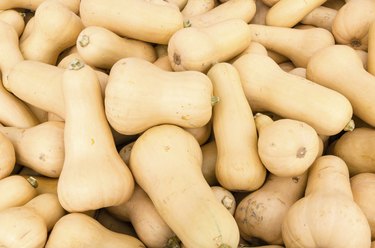
Butternut squash is a winter squash with a mild, slightly nutty flavor. Like all winter squash, butternut squash is a fat- and cholesterol-free, nutrient-dense vegetable, rich in fiber, beta-carotene, vitamin C, folate, niacin and potassium. Properly stored in optimum conditions, butternut squash retains its quality for up to six months.
Selection
Video of the Day
A ripe butternut squash is solid and feels heavy for its size. Select butternut squash with a firm, hard rind and a smooth, buttery or beige color. Avoid squash with soft spots, pits, blemishes or mold, or squash with soft rinds, which aren't ripe. Store squash only if it has a stem attached, as stemless squash won't keep well. Use stemless squash immediately.
Video of the Day
Whole
Whole butternut squash keeps best in a cool room where the squash won't freeze. For long-term storage, 45 to 50 degrees is ideal. At this temperature, butternut squash retains quality for up to six months. Store the squash on shelves or tables and not on a cold floor. Both colder and warmer temperatures shorten storage time. Larger squash store longer than smaller squash. Avoid storing whole squash in the refrigerator because the humidity causes the squash to deteriorate rapidly.
Cut
Refrigerate cut butternut squash immediately. Wrap the squash securely in plastic wrap, or slide the squash into a resealable plastic bag, then store the squash in your refrigerator's crisper drawer. When securely wrapped, cut butternut squash keeps it quality in the refrigerator up to five days. Don't store cut squash near ripening fruit such as apples or pears, as the release of ethylene gas shortens the storage life of the squash.
Cooked
To store cooked butternut squash, transfer the squash to an airtight container. Store cooked butternut squash in the refrigerator and use it within four to five days. Reheat cooked squash in a saucepan or in your microwave oven.